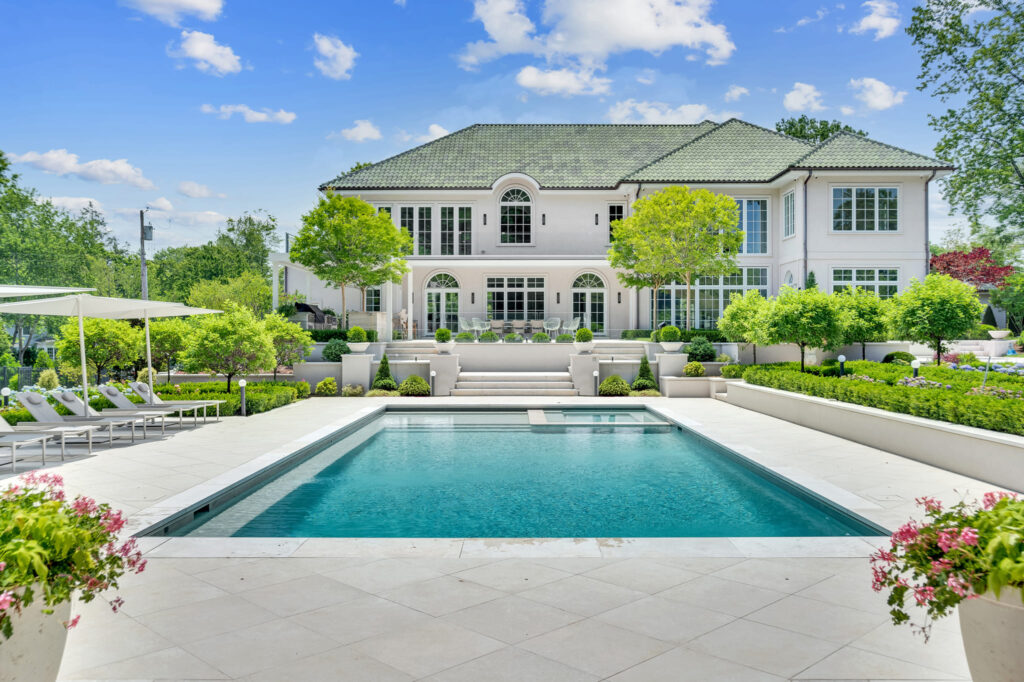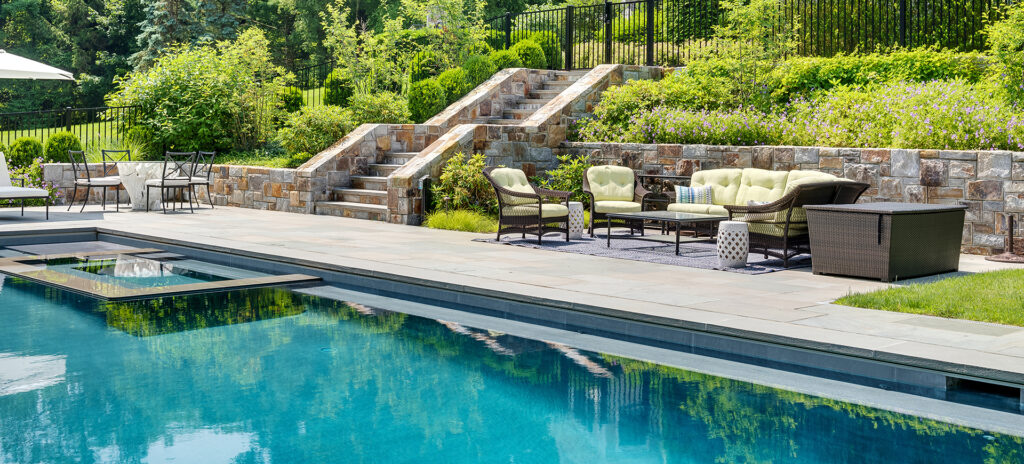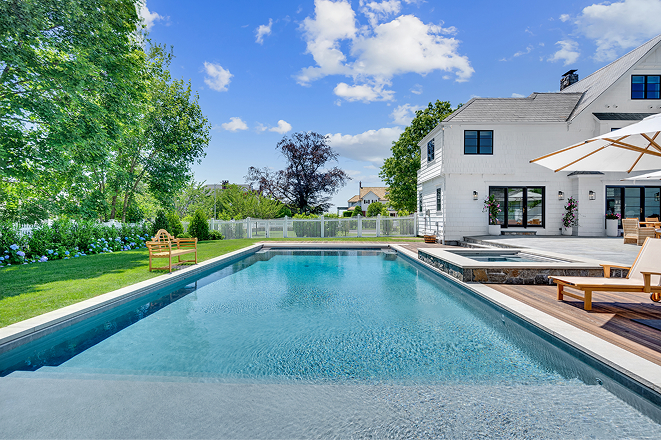While it’s easy to get lost in exciting pool design details like tiles and waterfalls, the most critical step is asking the questions that determine whether your new dream pool is a lasting investment or a future source of costly repairs.
To protect your investment and avoid common mistakes, this guide provides the complete checklist of essential questions to ask a pool builder. We cover everything from initial inground pool design ideas and transparent pool quotes to pool construction timelines and long-term warranties. Use these questions to ensure your pool installation goes smoothly and your investment brings decades of enjoyment.
Planning Your Pool Design: What Do You Really Want?
Before you interview a single pool builder, the most important conversation is with yourself. A clear vision for your pool design ensures your new backyard pool matches your lifestyle.
How Will You Use Your New Pool? Defining Your Vision
Before focusing on shape and size, it’s important to define the primary purpose of your pool. Consider the following:
- Primary Use: Will your pool be a hub for family fun, a serene escape for relaxation, or a lap pool for exercise?
- Key Features: Decide on your “must-have” elements. Do you need specific custom pool features like:
- A shallow tanning ledge for lounging?
- A deep end suitable for diving?
- An integrated spa for year-round use?
- List Your Priorities: Creating a list of these non-negotiables is the first step in the pool design process, helping to prevent costly changes later on.
Integrating Your Pool with Your Overall Outdoor Living Space
To ensure your pool is a seamless part of a larger backyard upgrade, consider how it will integrate with your overall outdoor living space:
- Furnishings and Flow: Plan the layout of your surrounding patio to accommodate lounge chairs, tables, and umbrellas for optimal sun and shade.
- Landscaping and Privacy: Determine if you will need new trees, fencing, or other landscaping elements to create a private and beautiful environment.
- Future Additions: Make sure your pool design leaves adequate space and a logical layout for any future projects you envision, like an outdoor kitchen, fire pit, or pergola.
How to Choose a Pool Builder: How to Vet a Pool Contractor
A beautiful portfolio means nothing without the professional credentials to back it up. Choosing the right pool builder is the single most important decision you’ll make in your pool construction journey.
Verifying Licenses, Insurance, and Pool Building Experience
To ensure you hire a trustworthy and professional pool builder, start by verifying these non-negotiable credentials:
- Licensed: Ask for their state or local license number and verify that it’s active.
- Insured: Request proof of both general liability insurance and workers’ compensation. This protects you from financial risk if an accident happens on your property.
- Experienced: Ask to see a portfolio of pools similar to yours in size and style. Inquire how many pools they build per year and how long their team members have been with the company.
Who Are the Subcontractors on My Pool Project?
Many pool builders use subcontractors for specific phases like excavation or electrical work. Ask your primary pool contractor for a list of their subcontractors and inquire about how long they’ve worked together. A pool builder with long-standing relationships is a sign of stability and quality.
How Much Does a Pool Cost? Understanding Quotes & Hidden Fees
A clear, detailed financial discussion is the cornerstone of a successful project. Don’t shy away from asking direct questions to determine a realistic budget for a new pool.
What is Included in a Pool Installation Quote?
A vague, one-page estimate is a red flag. Demand an itemized proposal that breaks down the entire average cost to build a pool, including:
- Permits and fees
- Excavation and dirt hauling
- Materials (steel, concrete, tile, coping)
- Plumbing and electrical
- Labor costs for each phase
- All pool features and equipment
Ask specifically about potential exclusions like fencing, landscaping, or extensive electrical upgrades.
How Are Unexpected Costs and Change Orders Handled?
Unexpected issues can arise. Ask the pool builder to explain their “change order” process and how they handle the most common hidden costs of building a pool. Any modification to the original plan should be documented in writing, with the pool cost clearly stated and approved by you.
Choosing Custom Pool Features and Technology
The right pool features and equipment will enhance your enjoyment and can even save you money over the life of your pool.
What Are the Most Popular Custom Pool Features?
This is where you bring your vision for custom pools to life. Discuss options that align with how you plan to use your pool.
- Tanning Ledges: These provide a shallow, built-in area that is perfect for sunbathing or for small children to play safely.
- Water Features: Features like waterfalls or deck jets can be incorporated to add a soothing sound and enhance the overall ambiance.
- Integrated Spa: This connects directly to your pool, allowing for year-round use and providing the benefits of hydrotherapy.
- LED Lighting: Modern LED systems can create stunning visual effects in the evening with a wide range of customizable colors.
Custom features can also play a huge role in how you can keep your Westchester/Rockland pool private.
What Is Energy-Efficient Pool Equipment?
Modern pool equipment offers significant long-term savings. Ask about energy-efficient pool equipment options:
- Variable-Speed Pumps: Upgrading to this technology can reduce your pool’s energy costs by up to 90% compared to older single-speed pumps.
- LED Lighting: This energy-efficient option uses significantly less electricity than traditional incandescent bulbs while also providing superior brightness and color options.
- Automation Systems: For ultimate convenience, these smart pool technologies allow you to control your pump, heater, lights, and other features directly from your smartphone.
How Long Does It Take to Build a Pool?
A realistic pool construction timeline helps manage expectations and prevents frustration. It’s a topic that should be discussed from two angles: the day-to-day process and your contractual protections.
Establishing the Project Timeline and Communication Plan
Before work begins, it’s essential to understand the builder’s plan for building a luxury pool on Westchester rock and how they will keep you informed. Be sure to ask for the following:
- A detailed project timeline that outlines each specific phase of the pool building process step-by-step, from securing permits and excavation to plastering and filling the pool.
- An explanation of common potential delays, such as those caused by inclement weather, inspection schedules, or supply chain issues.
- Clarification on their communication protocol, including how schedule changes are reported to you and how often you can expect progress updates.
What Happens if the Project is Delayed?
Beyond understanding the process, it’s vital to know how your contract protects you if the project goes significantly off-schedule.
- A professional pool builder’s contract should include language addressing significant, unexcused delays.
- Ask if the contract includes a “substantial completion” date, which is a firm deadline for when the pool will be usable.
- Inquire about what remedies are in place if that date is missed due to issues within the builder’s control.
What Kind of Warranty Should a Pool Have? Understanding Pool Equipment Warranties
Your relationship with the builder shouldn’t end when the pool is full. Planning for long-term pool maintenance starts with understanding your warranties and support options.
What Do Pool Warranties Cover?
Warranties vary significantly. Ask for specifics on the three main components:
- Structure: The concrete shell should have a long-term or even lifetime warranty against structural failure.
- Finish: The interior surface (plaster, pebble, etc.) typically has a shorter warranty of 5-10 years.
- Equipment: Pumps, filters, and heaters are covered by manufacturer warranties, usually ranging from 1-3 years.
What Happens After the Pool Installation is Complete?
A great builder provides a smooth transition to ownership and offers ongoing support to protect your new investment.
- “Pool School” and Handover: Your pool builder should provide a comprehensive training session to walk you through your new pool. This should cover operating all equipment, basic water chemistry, pool cleaning routines, and smart-system controls.
- Ongoing Maintenance Plans: Inquire if they offer professional weekly pool maintenance plans. This is an excellent option for busy homeowners who want to ensure their pool is always perfectly balanced and swim-ready.
- Future Service and Support: Confirm that the pool builder has a dedicated service department available for future pool repairs, pool upgrades, or questions.
What to Look for in a Pool Contract
The contract is your ultimate protection by transforming verbal promises into legally binding commitments. Do not sign anything until you have reviewed it thoroughly and are comfortable with every detail.
How Are Potential Disputes Handled in the Contract?
A professional contract will include a clause outlining a clear process for dispute resolution, such as mediation.
- Verify a Dispute Resolution Clause: Ensure the contract specifies the steps to take if a disagreement arises, preventing immediate and costly legal action.
- Confirm Mediation is Required: Look for a clause that requires mediation, where a neutral third party helps find a solution, before any other legal steps are taken.
- Understand the Process: This clause protects both you and the builder and is a sign of a professional, mature business.
Why You Should Always Ask for a Sample Contract
A builder’s willingness to share their contract is a litmus test for transparency. Hesitation is a major red flag.
- Demand a Detailed Document: The contract should clearly itemize all costs, timelines, specific equipment models, and materials.
- Identify Red Flags: Watch for vague language, blank spaces, unfair clauses that place all risk on you, or any pressure to sign immediately.
- Test for Transparency: A trustworthy builder will be proud to share a comprehensive, fair contract that protects both parties.
Let’s Get Building!
Ready to build the dream pool you’ve been envisioning? For over 50 years, Shoreline Pools has guided countless homeowners through the pool design and pool building process with confidence and precision. Call us today at (203) 357-1544 to take the first step toward creating a pool that checks every box on your wish list.




